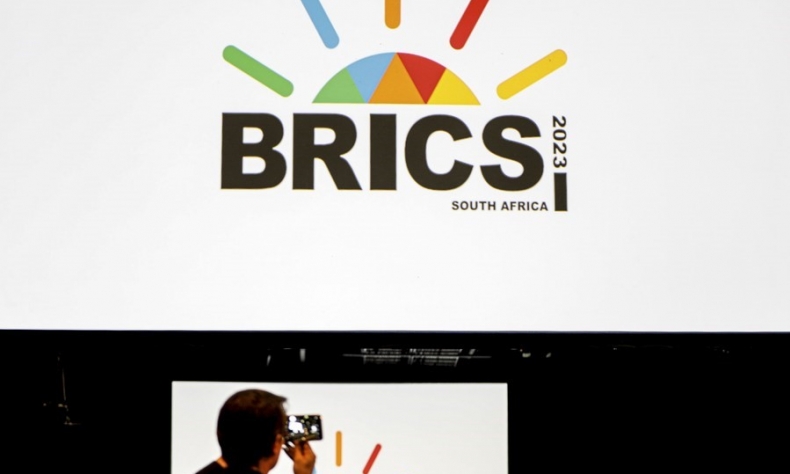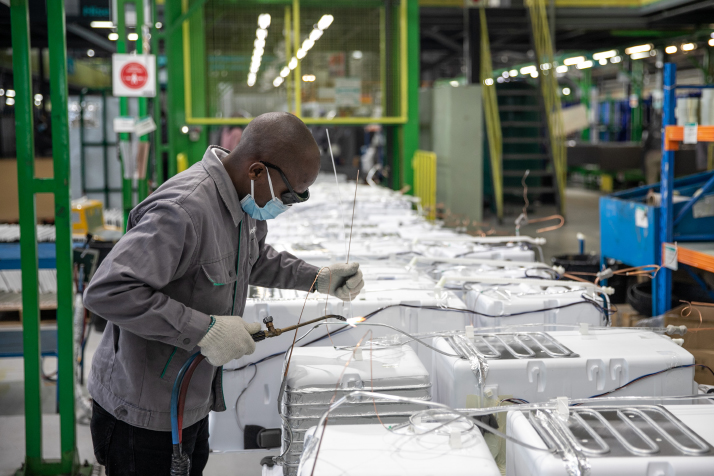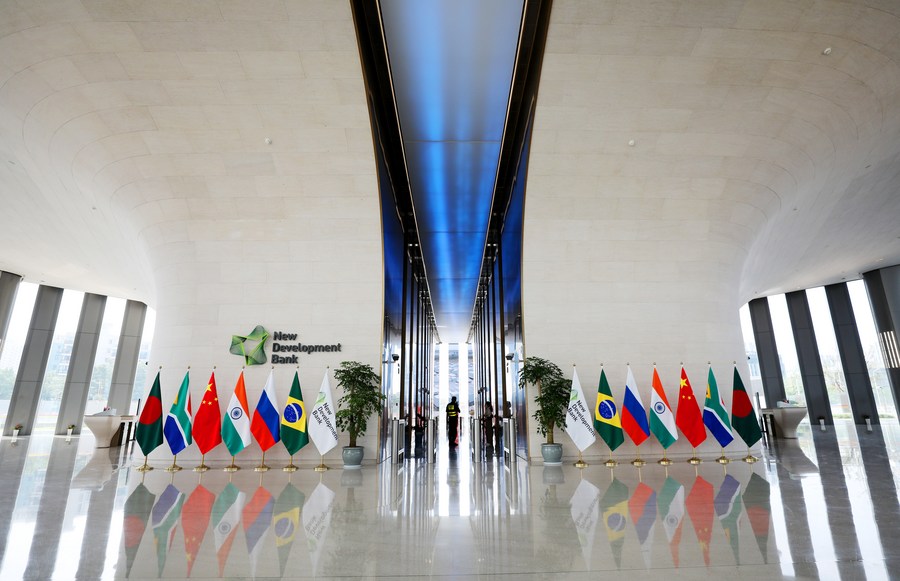Deconstructing Western Mischaracterizations of BRICS

China, and indeed the other BRICS members, do want to create multipolarity to replace what has long been and to some extent remains a unipolar world order.
Western mainstream media and pundits have long derided BRICS as an awkward mishmash of different economies and cultures with little in common. For the past decade and a half, their echo chambers assured us that BRICS was very little to do about nothing. But now, as BRICS has come of age, as it has begun to provide what many view as both a shared philosophy and practical framework for advancing a more equitable and multipolar world order, and with more than 40 countries reportedly seeking membership, the talk in Washington, London and elsewhere has shifted predictably.
Indeed, now that BRICS is no longer easily dismissed by its naysayers, it’s being recast by some in the West as a “Sino-centric conspiracy,” one that wants to align what have been described as the “mostly authoritarian” governments of the Global South against the democratic countries of the Global North. With that in mind, let’s deconstruct these characterizations and reveal their stark misrepresentations of simple facts.
From inevitable collapse to rising threat?
The change in Western discourses about BRICS maps neatly with similar changes in how the West talks about China. For a long time the dominant narrative about China promoted the so-called “collapse thesis.” This theory was based primarily on the values associated with the American scholar Francis Fukuyama’s “end of history” narrative—in so many words that history had proven that the American model of liberal democracy and free market capitalism was be-all-end-all of human development. Consequently, collapse theorists promised that China’s rapid economic development and increasing presence in global trade would assure a fundamental change in its political system, and would eventually establish a liberal democratic regime in Beijing similar to or at least compliant with the one in Washington.
Of course, there have been important changes in China, including lifting more than 800 million people out of poverty, eliminating extreme poverty altogether, and establishing a middle income population of more than 400 million. Along the way, China has fostered major improvements in governance and advanced its capacities to promote the wellbeing of the Chinese people, including reinforcing national sovereignty. In the meantime, many leading countries in the Global North experienced reversals in fortune, as well as declines in confidence in their own political economies. Consequently, “threat thesis,” which views China’s rise as dangerous to Western interests, began to displace the collapse thesis.

The same is true for Western narratives about BRICS. We were told BRICS members had little in common with each other economically, geographically, or culturally. We were told their collective flaws, underdevelopment and in some cases, the lingering conflicts between them, would make it difficult if not impossible for them to work together in meaningful ways. We were told that conflicts like the one between Russia and Ukraine or American efforts to kneecap China’s development would split them. And yet, here’s BRICS, stronger and coming of age 15 years later. Thus, there should be no surprise: A rising BRICS is being recast like a rising China—as a “global threat.”
This is typical of zero-sum logic and its simplistic balance sheet of winners versus losers. It’s also the logic of liberal democracy, as we see with the winner-take-all politics that’s reducing many Western countries to unstable and almost ungovernable messes. It’s likewise the logic of the sort of free market capitalism that more often than not normalizes poverty at home and abroad, denying both the Western poor and developing countries realistic opportunities to actualize their development potential. But the key point is: How does working in the best interests of the Global South pose a “global threat?”
Authoritarian versus democratic?
The Chinese political system is described officially as developing and practicing whole-process people’s democracy. On the one hand, this kind of Chinese democracy has been clearly institutionalized and reinforced via the rule of law, ensuring broad political inclusion and participation. On the other, it’s also worked effectively to ensure China can maximize the growth and development that Chinese people demand. Of course, whether or not foreign critics consider Chinese democracy to be democratic is beside the point: The Chinese Government enjoys substantial popular support at home, far outstripping the popularity of the Western-style democratic governments.
In fact, all the current members of BRICS practice various forms of democracy, and while each, including China’s, have not yet been perfected, almost everyone agrees that the Western models should not be blindly emulated. Let’s not allow a discussion of political philosophy to distract us from more fundamental questions regarding the lack of democracy in a global system dominated by Western and above all U.S. hegemony. Namely, what democratic right do Western countries have to tell others how to govern themselves? For decades this has been the standard practice, one that has often resorted to imposing Western models on developing nations, often by using economic coercion and military force.

In short, many Western countries, especially the U.S., do not practice democracy in global affairs. Instead, they assert the privileges of wealth and power, and do so through their domination of international organizations and their ability to control global financial mechanisms. French President Emmanuel Macron effectively acknowledged this problem when he suggested the West ought to endeavor to make international institutions more equitable and justice-oriented, rather than deriding the Global South for seeking better alternative pathways to development, such as BRICS. But such realization fell on deaf ears, including in Paris and Brussels, as the EU and others have been dragged backward in time into what appear to be U.S.-led efforts to reestablish a Cold War order.
Interestingly, as an organization, BRICS has been a paradigm of democratic practices. Furthermore, it’s not an anti-democratic association that’s seeking more anti-democratic countries from the Global South to join its ranks. Rather, the purpose is to extend greater democracy to countries that have been denied their democratic rights for development by Western-dominated systems that have instead chronically exploited them and effectively suppressed their ability to move forward in real democratic ways. This is what the founding BRICS members had most in common, and as they’ve put aside their differences and helped each other move forward, and this is why other developing countries have found prospective BRICS membership enticing.
Sino-centric?
China is the second largest economy in the world and the largest in BRICS. Despite this, China has resisted dominating its BRICS partners and instead emphasized equitable membership. This has not stopped Western critics from asserting that BRICS is part of a Beijing conspiracy to establish a Sino-centric world order, one that might negate a Western and above all American-dominated global system. But let’s be clear, China, and indeed the other BRICS members, do want to create multipolarity to replace what has long been and to some extent remains a unipolar world order. But this is not about asserting a China model or Chinese dream in place of the Washington Consensus or American dream. It’s about creating space for all to dream and realize those dreams, and to do so in ways that nurture a shared future for humanity.

There’s a strange contradiction at work in the allegation of Sino-centrism. On the one hand, Western discourse itself is Sino-centric, obsessively focusing on China and anything China touches as evidence of a rising threat to Western values and interests. Of course, if Western values and interests are based on hegemony and anti-democratic approaches to international relations, then perhaps China’s rise and that of BRICS do constitute threats. But the point I want to make here is that it is the non-stop, hysterical anti-China narratives that perpetuate in Western discourses that are themselves darkly but fantastically Sino-centric.
On the other hand, there is in fact a degree of Sino-centrism in China itself. This is both reasonable and unavoidable insomuch as it’s typical for many to think first of their interests, particularly when those interests are truly their own and not the business of others. But the great irony of actual Sino-centrism in China itself, which is quite out of favor, is its general tendency to be self-limiting. In short, Sino-centrism in China tends to be xenophobic and stay-at-home. It doesn’t fly to South Africa to join hands with leaders representing a very large percentage of humanity to discuss ways to improve their collective wellbeing, or consider the ambitions of 40 other nations who wish to join the same.
The author is a professor of politics and international relations at East China Normal University and senior research fellow with the Institute for the Development of Socialism with Chinese Characteristics at Southeast University.
 Facebook
Facebook
 Twitter
Twitter
 Linkedin
Linkedin
 Google +
Google +










